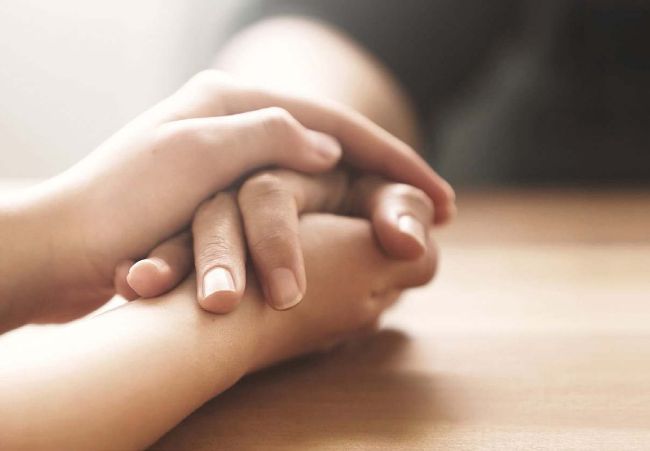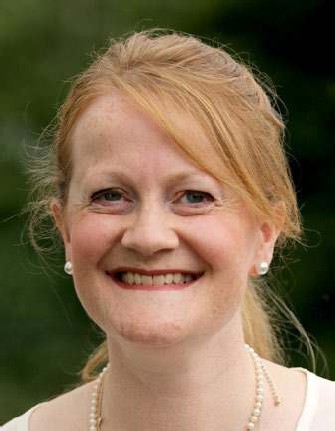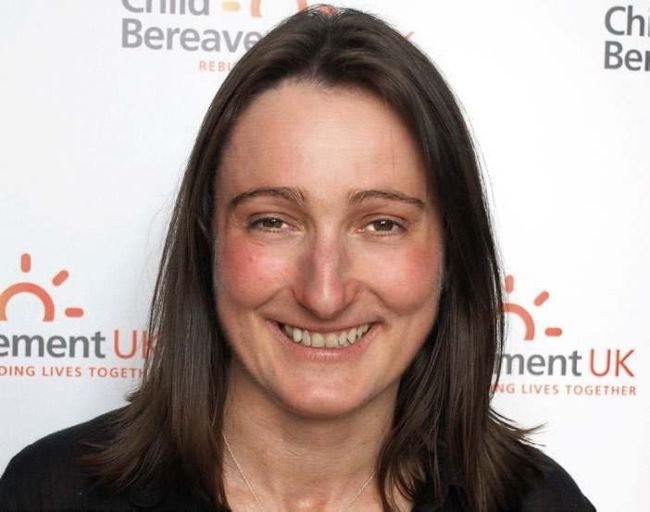“Heart based work”
Jackie Macadam learns about the work of two people working with bereavement care and hears how the Church can learn more.
FEATURE

Photo: iStock
CARE For the Family had the privilege of being one of the Guild’s project partners over the last three years.
“I, along with a team of speakers, visited nearly 300 Guilds, sharing our work with them. The total raised by the Guild for Care for the Family’s ‘Let Stick Together’ project, was £110,000. We were overwhelmed by the support, both financially and in prayer that we received, and of course the dozens of cups of tea along the way!”
Gill Lyth is National Representative for Care For the Family here in Scotland. It’s a national charity that aims to promote strong family life and to help those who face family difficulties.
“We cover three main areas.” Gill explains.
“Parenting, marriage and bereavement”, Gill says.
“We have developed a particular course that is designed to help people from churches or other organisations to help access the skills, information and knowledge they might need to give help efficiently and usefully.
“Bereavement Care Awareness has been produced as part of Care for the Family’s Bereavement Care training for churches. It is useful for clergy, church leaders, pastoral care teams or any volunteer interested in supporting bereaved people – whether they are engaged in bereavement support, or are considering the possibility of developing it.
During the interactive day, which is delivered by trained facilitators, delegates will develop knowledge, skills and understanding of how churches can be involved in providing appropriate levels of ongoing support, after the funeral, for people who have been bereaved following the death of a close family member or friend. Delivered to groups of 12 to 20, there are opportunities for discussion as well as teaching sections. A full training manual is provided to each delegate.
“This is not a course to train you to be a counsellor. There are expert people and organisations that are specifically trained in all areas of bereavement. We found that few churches knew about the availability of these bereavement support organisations. Indeed information about bereavement support is not routinely given by funeral directors, registrars or the NHS. At Care for the Family we have specialist support for those who have been widowed young and for bereaved parents. We also have an extensive directory of Scottish specialist support which will be shared at the training, and which you can signpost people to if a deeper level of support is required.
“They also learn about the impact bereavement has in people’s lives, identify the basic needs of bereaved people, and understand the different ways in which individuals commonly respond.
“Our hope is that this training day will allow you to identify the skills, structures and safeguards needed to provide appropriate levels of support to bereaved people within the context of your church.”
Gill grew up in the Church of Scotland.
“My mum was the Sunday School Superintendent, and my dad, the Session Clerk”, she says.
“I first heard about Care for the Family when I was a teenager and attended Spring Harvest. Rob Parsons, OBE, the founder and chairman of Care for the Family was speaking on the main stage and I remember being captivated by him. He is a wonderful storyteller and motivational speaker. Then, as a new parent, I attended a Care for the Family course at my local church. It was called Parentalk, and I believe it had a fundamentally positive effect on the way I parented my children, who are now ten and eight, in those early years.
“Two years ago, after selling my chocolate business, I saw an advert for a position with Care for the Family. I am very pleased to say that I absolutely love working with this family support charity, and have never looked back – it is even better than chocolate!
“The course seems to be really working and helping people deal with a difficult topic and experience in a helpful way.
“Often support is given to bereaved people immediately after the funeral, and there is a hope they will ‘get over it soon’. However, bereavement day to day anxieties do not end after the funeral. Sometimes there is little understanding that support is often needed long term. I spoke to one lady who said that within two weeks of her husband’s funeral a church member asked her if she was ‘getting back to normal?’ This was an upsetting and difficult question to be asked, and left her feeling nervous about admitting her ongoing need for help and support.
“Bereaved people can feel worse months later, after the numbness and busyness is wearing of. 84% of those bereaved in the last five years thought that people had been too uncomfortable to talk to them. (Dying Matters, 2016 survey British Peoples’ Attitudes to Bereavement)
“And indeed on many occasions people have shared with me their fear of not knowing what to say to a bereaved person, whether it be at the time of the death, or in the weeks following. We want to help people know what is helpful, and what is not.”
Some ‘Do’s and Don’ts’ put together by Care For The Family – https://www.careforthefamily.org.uk/wp-content/uploads/2014/05/Bereavement-How-other-people-can-help.pdf
The Rev Gayle Taylor, like most ministers, has conducted hundreds of funerals. She knows how bereavement can knock people of their feet and disrupt daily life. During a particularly difficult time in her life, she lost five members of her close family in the space of just three years.
“My grandparents died in fairly close succession and my family spent a lot of time visiting hospitals”, she said. “In the midst of this my uncle was brain injured in a hit and run accident in Spain and slowly deteriorated in hospital over two years.
“Bereavement affects the whole family with a ripple effect. My Grandpa died of cancer in the first year of his son’s non-responsive life in hospital and my Gran died after her son, which no parent expects to do, brokenhearted and with all the fight gone from her.
“When someone we are close to dies, it is a shock to the system and our whole perspective changes. A new ‘normal’ will have to emerge and for this to happen a fresh search for meaning and significance begins. For me, this was when the church became my safe and supportive place.
“I became as people often said, ‘an old head on young shoulders’ and ‘not your typical teenager’, I was deep and serious and had lots of questions and people my age at school were just not on the same page. It was at this time that one good youth leader was an anchor for me and my involvement in her Bible class led me to go on Summer Mission. Here, living in a church hall and mixing with all ages, gave me a new sense of purpose and framework for my questions about life and death. Looking back, this was the start of my calling to ministry, I’ve never flinched when faced with issues of life and death, I am not afraid to sit with people in the depths of their loss and questioning.”

Gill Lyth
“Our hope is that this training day will allow you to identify the skills, structures and safeguards needed to provide appropriate levels of support to bereaved people within the context of your church.
“It’s important to allow some of your emotional response to be seen by the parents when you are with them; being human is what counts
Gayle is putting all that personal pain and experience to use in her job now. She works with national charity Child Bereavement UK, which is partnering with Glasgow Children’s Hospital Charity and NHS Greater Glasgow and Clyde to provide support to families bereaved of a baby or child.
“Child Bereavement UK offers face to face, phone and online support to families when a child of any age dies or is dying, or when a child is facing bereavement.” Gayle says.
“Over my years of parish ministry in Glasgow and in Edinburgh, where I worked specifically with children and young people, I was given the opportunity to take day- release to study for a diploma in counselling and psychotherapy. This allowed me to be effective in supporting teenagers at the local high school when they experienced issues around bereavement, loss and transition.
“The contacts and experience I had access to through my counselling network were invaluable when it came to working with Child Bereavement UK. Child Bereavement UK is renowned for its work with children who have been bereaved of someone important in their life and with parents grieving the ‘unnatural order’ of the death of their baby or child. The charity also provides training courses for professionals who come into contact with bereaved families in their work.
“The team I work with in the Royal Hospital for Children in Glasgow comes from varied backgrounds and specialties: midwifery, nursing, social work and ministry. We provide access to guidance and signposting, listening support to families and training to hospital staff in Greater Glasgow and Clyde when a child or baby dies. I have also been privileged to do some work with Child Bereavement UK’s Scotland development project, working in partnership with local education, health and social care services, bereavement services and other voluntary organisations to ensure the co-ordination of support for all bereaved children and families.

The Rev Gayle Taylor
“When someone we are close to dies, it is a shock to the system and our whole perspective changes. A new ‘normal’ will have to emerge and for this to happen a fresh search for meaning and significance begins
“In this capacity I delivered a training evening to elders, ministers and chaplains in the presbytery of Glasgow where we particularly looked at how people working in a pastoral situation can look after themselves and not become desensitised to bereavement when working with it on a regular basis. I still work half the week in the church in Edinburgh and as a school chaplain and during this last year have been able to bring the resources of Child Bereavement UK into one of my schools for children with additional support needs where, sadly, the staff have to work with pre-bereavement and bereavement on a fairly regular basis.
“In this, our first year of working within the hospital, we have been welcomed with open arms and have relished the opportunity to provide bereavement support and training with the support of the Glasgow Children’s Hospital Charity.
“When a child or baby dies or is expected to die, the staff in the hospital now know to tell families that there is a hospital bereavement team. Sometimes they ask for guidance on what we can put in place for support sessions in the hospital or at their local health centre. Sometimes staff want support around how to talk to families, or for us to talk with families as we can take more time to sit with them and listen. Sometimes people phone us before the funeral to set up an appointment or after the funeral when it really hits them. Sometimes they simply take a leaflet away and call us months later when they need support further down the line.
“In the first months of the service, all the parents referred to us were at the very start of their grief process and it was tough to have everyone in the darkest, most raw stage of their grief. We have new referrals like that but also some parents I’ve been working with on an ongoing basis show steady signs of restoration and more good days than bad.
“You have to practise what you preach to the hospital and take good self-care. It’s important to allow some of your emotional response to be seen by the parents when you are with them; being human is what counts. Sometimes all you can do is share a tear together. When parents tell you they have just lost their son or daughter and have to find a way to say goodbye when they haven’t had enough time with them, it’s absolutely heartbreaking. It is heart-based work.”
For more information on the work of Child Bereavement UK visit www.childbereavementuk.org.